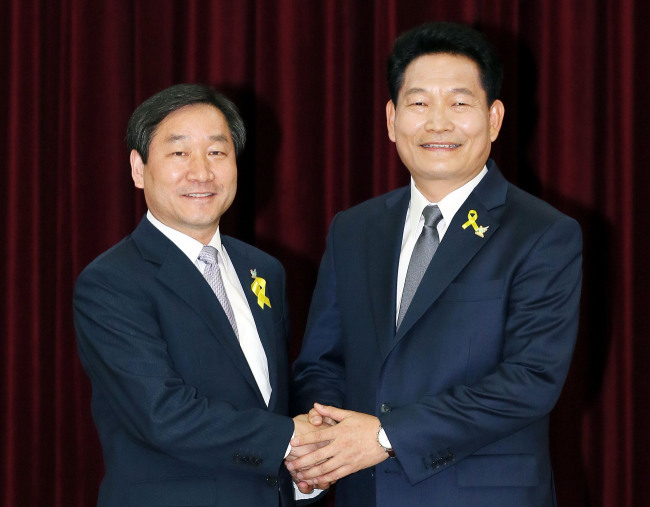This is the fifth installment in a series of articles on the upcoming local elections, exploring key issues and candidates in major cities. ― Ed.
Incheon was not expected to be one of the several regions that would see neck-and-neck races in the June 4 local elections, as the incumbent Mayor Song Young-gil was leading Yoo Jeong-bok, the candidate from the ruling Saenuri Party, by more than 10 percentage points in early May.
Recent polls, however, showed that the voter approval rating gap between the two candidates has sharply narrowed to under 5 percentage points, heralding a tight race for the remaining seven days.
 |
| Incheon Mayor Song Young-gil (right) shakes hands with Saenuri Party candidate Yoo Jeong-bok during an event to pledge fair campaigns earlier this month. (Yonhap) |
According to a survey conducted by the Focus Company, which was publicized by an online news provider on Wednesday, Song and Yoo posted approval ratings of 32.2 percent and 30.7 percent, respectively. The poll was reportedly carried out from May 24-26.
Further, as 1 in 3 respondents were still undecided, Song and Yoo are expected to conduct aggressive campaigns to win over the swing votes.
Experts say the next Incheon mayor will ultimately be selected by the swing voters, which make up around 30 percent of the approximately 2.3 million registered voters living in the port city.
By approval rating for political party, the governing Saenuri Party trumps the main opposition New Politics Alliance for Democracy by more than 40 percent to 23 percent, several polls showed.
Song was a former lawmaker with the liberal Democratic Party, a predecessor of the NPAD. Yoo had served as a security and public administration minister.
The NPAD nominated Song for the Incheon mayoral seat without conducting primaries, crediting him for hosting the U.N. Green Climate Fund last year and attracting international investment.
Yoo has served as a close aide of President Park Geun-hye and stepped down as the security and public administration minister in March. Yoo’s move was seen as politically influenced by the president so that he could take the Incheon mayor seat.
Electoral research analysts say that key factors for the upcoming election in Incheon, west of Seoul, include the recent ferry disaster, income polarization with Seoulites, bottom scores in education, GM’s automobile manufacturing unit in Bupyeong district and the 2014 Incheon Asian Games, slated for Sept.-Oct.
Above all, the accident of the ill-fated Sewol ferry, which had a death toll of more than 280, has turned citizens against the incumbent central government, and this is negatively affecting ruling party contenders in major cities and provinces including Incheon.
Incheon’s population composition contrasts with that of major cities such as Busan, Daegu, Daejeon, Gwangju and Ulsan.
Citizens born in Incheon are estimated to comprise less than 20 percent of the region’s registered voters, while those from the Jeolla and Chungcheong provinces account for a majority.
In addition, many of the city’s 2.89 million residents commute to work in Seoul or cities in nearby Gyeonggi Province.
The commuters aim to move whenever such conditions as home prices and proximity to their workplace are met. As a result, Incheon records the lowest voter turnout out of the six metropolitan cities and 12 provinces in almost every local election.
By Kim Yon-se (kys@heraldcorp.com)

